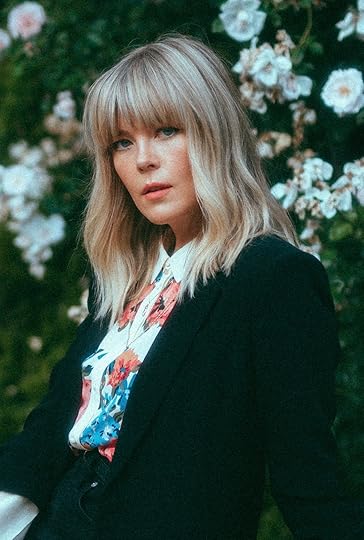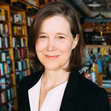It’s Always Everything All at Once: An Interview with Chelsea Bieker

“The world is not made for mothers. Yet mothers made the world.” From the very first words of Chelsea Bieker’s Madwoman, I was hooked. I went into this book expecting a story much like so many I have read in the past: a story of a woman at the end of her rope, unfulfilled in her marriage and in motherhood and wondering what to do next. What Madwoman gave me was that and so much more. This is the story of Clove, a woman running from a traumatic past and doing all she can to bury her demons. Chelsea Bieker has written a novel filled with suspense and serious heart, and I was thrilled to be able to pick her brain about it.
— Maddie Grimes, Parnassus bookseller
 Chelea Bieker | Photo by Wondra
Chelea Bieker | Photo by WondraMaddie Grimes: Hi Chelsea! First of all, I absolutely loved this book. Madwoman is one of those books I’m glad I went into knowing less, because it has so many rich layers that revealed themselves to me as I read on. One of my absolute favorite parts of this story is Clove’s obsession with her local wellness grocery store. Can you tell me about how this aspect of her character came to be? Is this something you relate to yourself?
Chelsea Bieker: I’m so glad this is one of your favorite aspects of the book! It’s one of mine too and was so fun to write. Talk about write what you know… The parts about the grocery store being Clove’s safe place and the wellness products she’s obsessed with are some of the closest drawn aspects of Clove to my lived experience. I wanted to show the ways she grasps for control with these external things, in a way that is societally approved—like, she’s not robbing a bank or getting drunk—she’s just buying adaptogen powders and liposomal forms of vitamin C. There’s something so appealing to her about being able to optimize your life, and Clove has been to hell and back and now she wants to not just live, but to thrive. Her first job after escaping her childhood is at this little grocery store in San Francisco. It’s really formative for her because it’s the first adult experience she has apart from her parents. It’s there she meets “the Glowing Woman” who seems like the pinnacle of what she wants to be. Luxury grocery and wellness represents a kind of stability and safety and removal from her childhood. But what she learns over the course of the book is that the harder thing is the deeper emotional work that can’t be found on a shelf. Still, I want to really stand by the fact that her impulse for wellness isn’t bad per se…(though for her it tips into some unhealthy patterns and she’s in a ton of debt over it) but it’s also a sort of claim she’s making, too, about self-worth. At the beginning of the book her mother pines after a Crystal Geyser bottled water and as a kid she doesn’t get it. But later she learns it’s about dignity. It’s about even in the worst of circumstances, still finding yourself worthy of something nice or high quality. She feels a little thrill every time she drinks a delicious organic smoothie. In a way, she’s re-mothering herself. I’m interested in all these layered motivations behind what we buy and what we hope our purchases will offer us beyond the practical. Some days in early motherhood, I really hoped the right bone broth would save me. There’s some inherent comedy in that hope, and it’s also heartbreaking too.
MG: Underneath everything, Clove is a person who comes from intense and brutal trauma, and yet she was for me one of the most relatable women I’ve read in a long time. How important was it to you to incorporate this traumatic childhood into your character’s life while also maintaining her as someone who all women can relate to?
CB: Thank you! It was so important to me that she comes across as a whole human and not just a victim. We see her fall in love for the first time, we see her explore female friendship, we see her open popsicles for her kids and go to Music Together class. We all have emotional depths we must contend with on a daily basis, and yet we all still have to go grocery shopping. As mothers you feel this distinctly because when you are around children all day, that doesn’t prohibit you from having desire, longing, ruminations, and a very rich interior life against the backdrop of a playground. It’s always everything all at once. So yes, Clove is coming from this pretty horrific childhood, and she’s also living her life. Her biggest fantasy is for normalcy which she does achieve in many ways. But I also wanted to show that you can be doing the most normal things possible, and you can present a certain way outwardly, meanwhile, yeah, there’s a host of internal pain and drama you’re contending with at the same time. I hope I also showed this with the scenes with her and her mother—you know, they live in poverty and in a violent and controlling situation, but they still sneak to the Goodwill to try on vintage designer dresses. I think it’s in those ways you maintain your humanness. My mom never lived a day without her lipstick. I kid you not, getting dropped off at a detox facility, she’s asking if she can take her lipstick in. You know, it’s always both things.
MG: In most novels with tortured mothers as main characters, the husband — whether fully with intention or through mere apathy and ignorance — serves as the stand-in villain of the book. However this is very much not the case in Clove’s story. Were you intentional about avoiding this trope in Madwoman? How do you see Clove’s husband as he fits into her story?
CB: It’s funny because in my past work I’m not sure I ever really wrote the character of a “good guy.” But in this book we have two pretty decent guys—her first love, and her husband. They provide a balance to the story, because her father is more of a villain, but I wanted to show her navigate romantic relationships where the conflicts are more at the micro-level. Writing about violence directly can be boring. Same with addiction. It’s the effects surrounding these things that is interesting, but the acts themselves are predictable and stagnant. There’s no denying her father’s violence is awful, but I like the way with her other relationships with men it’s less obvious who is doing what wrong. It’s slippery. I wanted to show how trauma plays out years removed within the confines of a marriage where one person has suffered great trauma and loss and the other hasn’t. The loneliness of the other person not really getting it, even though they try. She doesn’t believe her husband will understand what she’s been through because he’s been so nurtured his whole life. And she’s right. He will never truly, truly understand it, or what it’s like to be a woman in this world. He can try, but there’s no way to know truly unless you’ve been there. But the attempt to understand is necessary. My energy healer in Portland said something wise in terms of what it will take to heal patriarchal wounds. I hope I don’t butcher her words, but it was something along the lines that men will have to repent and account for and apologize repetitively. It’s not just one time. It’s a constant checking in, an active desire to make change to heal patriarchal imbalance. The book explores Clove having to figure out how to give her husband a chance to attempt this, and the first step is a more honest intimacy between them. For him to really know her. I wanted his capacity to be surprising, and also for their relationship to provide some comic relief to the story. I think they have a rather dry, funny rapport together.
MG: When you are writing a character like Clove who comes from a childhood rooted in violence and neglect, how do you toe the line of wanting to give your character a happy ending while also remaining realistic for readers?
CB: Such a great question! I think a lot about writing into my own personal fantasy. Fiction can offer us what we didn’t receive in real life. Whether that’s a conversation we’ve longed to have, or redemption where before there was none, or a sense of karmic justice—I like to think of my endings as doors opening rather than closing. I want there to be a sense of continuation and growth versus a conclusion. I’m a sap for miracles and for unlikely solutions and for saves at the final moment, and I like to play with that, knowing that in a story like this, there is no fairytale ending to be had, but there can be growth and turns of fate. While to me, the ending of Madwoman is ultimately hopeful, it still contains all the complication and brutality of everything that came before. But we get the sense of forward motion. Of connection versus separation.
MG: I am so excited to see this book come out and for more readers to get their hands on it. Once it is published, who do you hope sees themselves in Clove’s story and what do you hope readers take away?
CB: I hope mothers and caretakers see themselves in this — this is very much a book that sees and honors them — and I hope that people might understand domestic violence and the complexities of PTSD more after reading. Our mainstream understanding of DV needs to deepen and shift. I still see problematic portrayals all the time, and I want there to be a heightened conversation about it that reaches the masses. It touches so many lives. Other than that, I think there’s a little Clove in all of us. Doing the work to break the cycle of generational trauma is no easy task and I see so many of my friends doing this work. I wanted to write a book that was funny and entertaining and a great page turning story but also something that will invite readers to think deeply about their lives. I love fiction that challenges us to think beyond the scope of good and evil into more surprising territory. I wrote this with a lot of love and a lot of heart. I hope people read it together and have connective conversations out of it. That would be my dream.
MG: Finally, we always end with this question: what is your favorite thing about independent bookstores?
CB: Bookstores are everything. They are the heart of every community. They are my favorite place (besides the grocery store, ha!) to be because I feel instantly energetically understood in them. The shelf talkers, the booksellers, the way everything feels so personal. Inside is proof that people think in nuanced, complex ways, that people are interested in emotional journeys and art and beauty. It’s proof of goodness. I hope to visit Parnassus soon! Thank you so much for this.
Madwoman is on our shelves now! Get your copy today.
Ann Patchett's Blog
- Ann Patchett's profile
- 27422 followers




